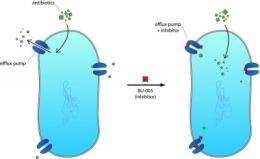New compound defeats drug-resistant bacteria

It's no wonder that medicine's effort to combat bacterial infections is often described as an arms race. When new drugs are developed to combat infections, the bacterial target invariably comes up with a deterrent.
A particularly ingenious weapon in the bacterial arsenal is the drug efflux pump. These pumps are proteins located in the membranes of bacteria that can recognize and expel drugs that have breached the membranes. In some cases, the bacterial pumps have become so advanced they can recognize and expel drugs with completely different structures and mechanisms.
"This turns out to be a real problem in clinical settings, especially when a bacterial pathogen acquires a gene encoding an efflux pump that acts on multiple antibiotics," said Jason Sello, assistant professor of chemistry at Brown University. "In the worst case scenario, a bacterium can go from being drug-susceptible to resistant to five or six different drugs by acquiring a single gene."
"That leaves two choices: Make more new and costly antibiotics or find a way around the pump. Sello and his group chose the latter. In a paper published in the journal Bioorganic and Medicinal Chemistry, the team reports it has discovered a new compound of C-capped dipeptides, called BU-005, to circumvent a family of drug-efflux pumps associated with Gram-positive bacteria, which include the dangerous MRSA and tuberculosis strains. Until that discovery, C-capped dipeptides were known to work only against an efflux pump family associated with Gram-negative bacteria.
"If drug efflux pumps are inhibited, then bacteria will be susceptible to drugs again," Sello said. "This approach is of interest because one would have to discover efflux pump inhibitors rather than entirely new kinds of antibacterial drugs."
Recently, a company called MPEX Pharmaceuticals discovered that specific C-capped dipeptides could block the efflux pumps of the RND family, which are responsible for much of the drug resistance in Gram-negative bacteria. One of these compounds developed at MPEX advanced to phase I of an FDA clinical trial. Sello and his co-authors investigated whether C-capped dipeptides could block the pumps of another drug efflux family, called the major facilitator superfamily (MFS), which is associated mostly with Gram-positive bacteria.
The Brown team thought that new and perhaps more potent C-capped dipeptide efflux pump blockers could be discovered. Since it is not possible to predict which C-capped dipeptides would be efflux pump blockers, they synthesized a collection of structurally diverse C-capped dipeptides and screened it for compounds with new or enhanced activities.
Normally, this is a four- to five-step process. Sello's group reduced that to two steps, taking advantage of a technique used in other chemistry practices, known as the Ugi reaction. Using this approach, the team was able to prepare dozens of different C-capped dipeptides. They assessed each compound's ability to block two efflux pumps in the bacterium Streptomyces coelicolor, a relative of the human pathogen Mycobacterium tuberculosis and which resists chloramphenicol, one of the oldest antibacterial drugs.
From a collection of nearly 100 C-capped dipeptides that they prepared and tested, the group discovered BU-005. The new compound excited the researchers because it prevented the MFS efflux pump family from expelling chloramphenicol. Until now, structurally related C-capped dipeptides had only been reported to prevent chloramphenicol expulsion by other drug efflux pump families.
"Our findings that C-capped dipeptides inhibit efflux pumps in both Gram-positive and Gram-negative bacteria should reinvigorate interest in these compounds," Sello said. "Moreover, our simplified synthetic route should make the medicinal chemistry on this class of compounds much simpler."
Two Brown undergraduate students, Daniel Greenwald '12, and Jessica Wroten '11, helped perform the research and are contributing authors on the paper.
Greenwald joined the team in his freshman year, after reaching out to Sello. "This project was the first real immersion I had into chemistry research at an advanced level," said Greenwald, of Madison, Wisc. "It was an amazing opportunity to be able to use the tools of synthetic chemistry to address problems from molecular biology. It was definitely one of the most engaging aspects of my experience at Brown."
Provided by Brown University

















